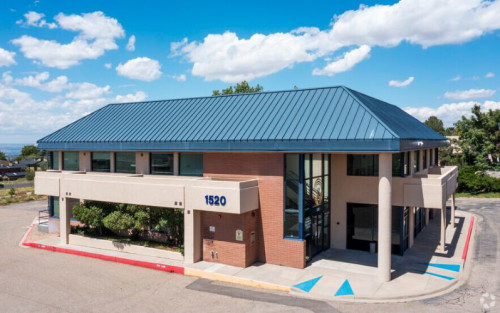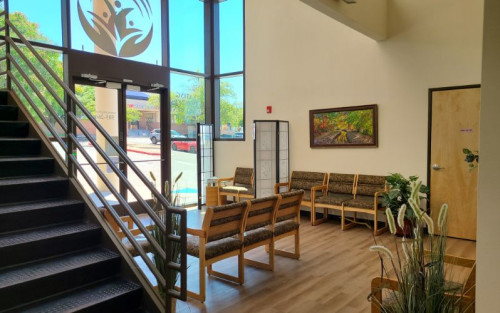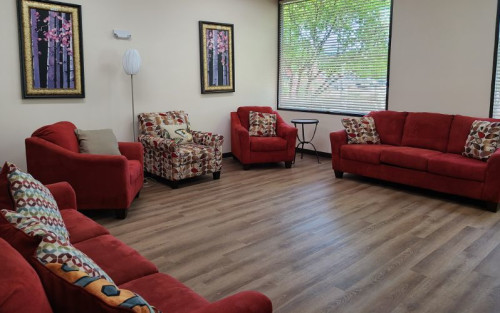






Eating Disorders Treatment Center
Treatment Focus
You can get treatment for eating disorders at this center, helping you navigate symptoms, build coping tools, and restore your physical health under expert care.
Primary Level of Care
Outpatient treatment offers flexible therapeutic and medical care without the need to stay overnight in a hospital or inpatient facility. Some centers off intensive outpatient program (IOP), which falls between inpatient care and traditional outpatient service.
This provider hasn't verified their profile's information. Are you the owner of this center? Claim your listing to better manage your presence on Recovery.com.
Treatment Focus
You can get treatment for eating disorders at this center, helping you navigate symptoms, build coping tools, and restore your physical health under expert care.
Primary Level of Care
Outpatient treatment offers flexible therapeutic and medical care without the need to stay overnight in a hospital or inpatient facility. Some centers off intensive outpatient program (IOP), which falls between inpatient care and traditional outpatient service.
Provider's Policy
We accept most behavioral health insurance plans for our counseling services and can accept most health insurance plans for nutrition counseling sessions. We have carefully screened interns who can also help you for a nominal fee. Please do not go without the treatment you need because of money. We will work out affordable payment options with patients. Our philosophy includes treating those in need who do not have insurance benefits.
Eating Disorders Treatment Center
Eating Disorders Treatment Center
About Eating Disorders Treatment Center
Eating Disorders Treatment Center (EDTC) is the only facility in the state of New Mexico dedicated to the treatment and recovery of eating disorders. Using a collaborative approach, EDTC offers dietitian services, personal therapy, psychiatry services, and group therapy to help each patient reach their individual goal. They can treat the most common disorders, anorexia nervosa, bulimia nervosa, and binge eating disorder, as well as other eating disorders such as night eating syndrome, laxative abuse, body image distortion, and body dysmorphia. In addition, EDTC can treat other behavioral health issues like obsessive compulsive disorder, trauma, depression, anxiety, bipolar, and dissociative identity disorders.
Intensive Outpatient Programs
EDTC has tailored IOPs for adolescents, adults, and binge eating disorder. For all IOPs, patients will receive a nutritional evaluation and 1-on-1 counseling with one of their staff dietitians. Dietitians will work with patients to help them meal plan and build a simple, nutritious meal to eat with the group each evening. At the conclusion of the meal, their therapists work with patients to process the experience. Various evidence-based and expressive therapeutic methods are used throughout treatment.
Both the adolescent and adult programs meet from 4:15pm until 7:15pm 4 days each week. One session each week is devoted to family focused treatment where patients and their families will work together on issues. For the adult program, patients can bring in significant others or family members who are important in their recovery. The binge eating disorder IOP focuses on helping people of all ages and genders experiencing symptoms of binge eating disorder. The program is designed to help people discover and address the roots of their symptoms, work towards finding peace with food, and develop healthy coping skills. This program includes a monthly meeting of the individual’s family/support group to help facilitate psychoeducation and relationship building.
Partial Hospitalization Program
The PHP operates from 12:30pm until 6:30pm Monday-Friday, with an extended hour for family programming on Tuesday nights. Throughout treatment, patients are provided 2 meals and 1 snack daily under the guidance of registered dietitians and dietary aides. The program includes group instructional and counseling sessions, individual counseling, and medical and psychiatric evaluations. Patients will be exposed to various expressive and experiential therapies and will meet with a registered dietitian weekly to monitor personalized meal plans.
Nutritional Counseling
EDTC offers nutritional counseling services to everyone, not just individuals with a diagnosed eating disorder. Their staff dietitians will address nutritional status and eating disorders, provide weight monitoring when appropriate, and encourage healthy thinking and behaviors about food. They will provide tailored nutrition education and recommendations, explore patient’s relationship with food and body image, and set appropriate goals in working toward intuitive, healthy eating. Staff are trained to address a variety of nutrition and dietetic issues like diabetes, celiac disease, irritable bowel syndrome, weight management, and more.
Center Overview
Treatment Focus
You can get treatment for eating disorders at this center, helping you navigate symptoms, build coping tools, and restore your physical health under expert care.

Insurance Accepted
Cash Pay Rates
Estimated Cash Pay Rate
Center pricing can vary based on program and length of stay. Contact the center for more information. Recovery.com strives for price transparency so you can make an informed decision.
Levels of Care





Your Care Options
Specializations
Eating Disorders
An eating disorder is a long-term pattern of unhealthy behavior relating to food. Most people with eating disorders have a distorted self-image.
Who We Treat
Adolescents
Teens receive the treatment they need for mental health disorders and addiction, with the added support of educational and vocational services.
Children
Treatment for children incorporates the psychiatric care they need and education, often led by on-site teachers to keep children on track with school.
Approaches
Personalized Treatment
The specific needs, histories, and conditions of individual patients receive personalized, highly relevant care throughout their recovery journey.
Experiential
Expressive tools and therapies help patients process past situations, learn more about themselves, and find healing through action.
Evidence-Based
A combination of scientifically rooted therapies and treatments make up evidence-based care, defined by their measured and proven results.
Family Involvement
Providers involve family in the treatment of their loved one through family therapy, visits, or both–because addiction is a family disease.
Individual Treatment
Individual care meets the needs of each patient, using personalized treatment to provide them the most relevant care and greatest chance of success.
Therapies
1-on-1 Counseling
Patient and therapist meet 1-on-1 to work through difficult emotions and behavioral challenges in a personal, private setting.
Family Therapy
Family therapy addresses group dynamics within a family system, with a focus on improving communication and interrupting unhealthy relationship patterns.
Acceptance and Commitment Therapy (ACT)
This cognitive behavioral therapy teaches patients to accept challenging feelings and make the appropriate changes to reach personal goals.
Psychoeducation
This method combines treatment with education, teaching patients about different paths toward recovery. This empowers them to make more effective decisions.
Art Therapy
Visual art invites patients to examine the emotions within their work, focusing on the process of creativity and its gentle therapeutic power.
Somatic Experiencing
This method treats emotional trauma stored in the body. A therapist helps patients work through the physical feelings associated with emotional pain.
Meditation & Mindfulness
A practiced state of mind that brings patients to the present. It allows them to become fully aware of themselves, their feelings, and the present moment.
Conditions We Treat
Anxiety
Anxiety is a common mental health condition that can include excessive worry, panic attacks, physical tension, and increased blood pressure.
Depression
Symptoms of depression may include fatigue, a sense of numbness, and loss of interest in activities. This condition can range from mild to severe.
Obsessive Compulsive Disorder (OCD)
OCD is characterized by intrusive and distressing thoughts that drive repetitive behaviors. This pattern disrupts daily life and relationships.
Bipolar
This mental health condition is characterized by extreme mood swings between depression, mania, and remission.
Trauma
Some traumatic events are so disturbing that they cause long-term mental health problems. Those ongoing issues can also be referred to as "trauma."
Eating Disorders
An eating disorder is a long-term pattern of unhealthy behavior relating to food. Most people with eating disorders have a distorted self-image.
Languages
Care Designed for Your Needs
Special Considerations
Healthy Meals are provided
Great food meets great treatment, with providers serving healthy meals to restore nutrition, wellbeing, and health.






